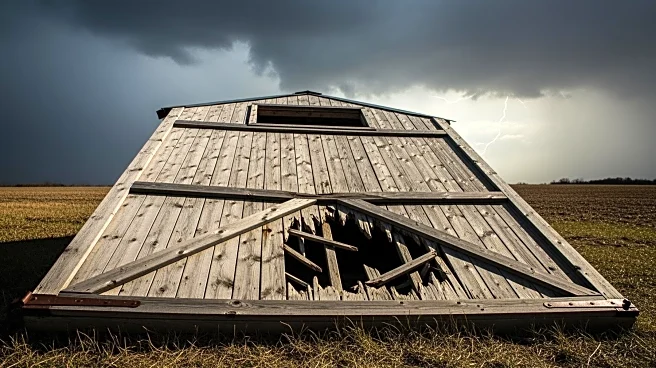What's Happening?
The Minister of Agriculture, Fisheries and Mining, Floyd Green, has reported significant damage to Jamaica's agricultural sector following Hurricane Melissa. The storm has resulted in approximately $29.5 billion in losses, affecting 41,390 hectares of farmland
and over 70,000 farmers. Key crops such as sweet pepper, tomato, lettuce, cabbage, and vine crops have suffered substantial losses, with domestic crops alone accounting for $8.8 billion in damages. Additionally, banana and plantain crops have incurred $2.9 billion in losses, while tuber crops like yams and cassava have seen $4.5 billion in damages. The livestock sector has also been severely impacted, with over a million birds lost, amounting to $2 billion in losses. Infrastructure damage includes 38 greenhouses and 337.2 kilometers of farm roads, with repair costs estimated at $4.3 billion.
Why It's Important?
The extensive damage to Jamaica's agricultural sector due to Hurricane Melissa has significant implications for the country's economy and food security. With over 70,000 farmers affected, the loss of crops and livestock could lead to increased food prices and shortages, impacting both local consumption and export potential. The damage to infrastructure and farm roads further complicates recovery efforts, potentially prolonging the economic impact. The fisheries sector, with losses amounting to $5.76 billion, highlights the storm's broad impact across various agricultural domains. The scale of the damage underscores the vulnerability of the agricultural sector to natural disasters and the need for robust disaster preparedness and recovery strategies.
What's Next?
Recovery efforts will likely focus on rebuilding infrastructure and supporting affected farmers to restore production levels. The government may need to allocate resources for immediate relief and long-term recovery plans, including financial aid and technical support for farmers. There could be discussions on improving disaster resilience in the agricultural sector, possibly involving investments in infrastructure and technology to mitigate future risks. Stakeholders, including government agencies and agricultural organizations, will play a crucial role in coordinating recovery efforts and ensuring the sector's sustainability.
Beyond the Headlines
The impact of Hurricane Melissa on Jamaica's agriculture sector raises questions about climate change and its role in increasing the frequency and intensity of such storms. The long-term implications may include shifts in agricultural practices and crop selection to adapt to changing weather patterns. Additionally, the disaster highlights the importance of sustainable farming practices and the potential for innovation in agriculture to enhance resilience against natural disasters.

















